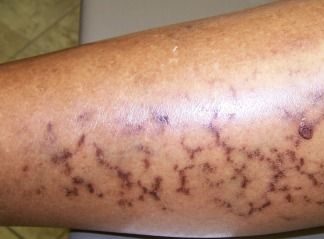- Clinical Technology
- Adult Immunization
- Hepatology
- Pediatric Immunization
- Screening
- Psychiatry
- Allergy
- Women's Health
- Cardiology
- Pediatrics
- Dermatology
- Endocrinology
- Pain Management
- Gastroenterology
- Infectious Disease
- Obesity Medicine
- Rheumatology
- Nephrology
- Neurology
- Pulmonology
Erythema ab Igne in a 66-Year-Old Black Woman
This 66-year-old black woman presented with a 2-year history of a painless skin eruption. She stated that her skin had “changed overnight” while she was caring for her mother who had been hospitalized.

This 66-year-old black woman presented with a 2-year history of a painless skin eruption. She stated that her skin had “changed overnight” while she was caring for her mother who had been hospitalized. The patient could not determine the cause of the discoloration. She denied using heating pads, electric heaters, or electric blankets. She stated that she had not been sitting near any fireplaces and initially denied any heat exposure. Over-the-counter cocoa butter had not ameliorated the eruption.
Examination revealed patches of darker, mottled pigmentation and reticulated mild erythema. A biopsy disclosed angiodermatitis with superficial scar and abnormal elastic fibers. There was capillary hyperplasia. An iron stain failed to reveal any significant hemosiderin deposit. This pattern of abnormal elastic fibers is often found in long-standing erythema ab igne.
We prescribed a urea-based cream 40% to be applied twice daily and recommended that the patient wear support hose. We also considered treatment with a 532-wavelength laser for both the dyspigmentation and erythema; however, the risk of depigmentation made this suboptimal given this patient’s dark skin color.
We were perplexed as to how this condition could occur without heat exposure. After repeated questioning, the patient finally remembered that when her mother was sick, she sat by her bedside. The patient’s mother was on a ventilator, which expelled considerable heat. Our final diagnosis, therefore, was erythema ab igne triggered by the heat radiating from the ventilator.
Erythema ab igne is most common on the legs of overweight women between the ages of 40 and 70 years who sit in front of fireplaces or who apply some type of heater.1-3 This condition has also been attributed to exposure to a wide variety of heat-producing objects, including electric blankets, hot water bottles, wood stoves, and laptop computers.3-5 There is a report of erythema ab igne that developed over a 2-week period in a woman from Taiwan who had undergone multiple Chinese footbath treatments using hot water.2,6
Erythema ab igne can also stem from chronic exposure to heat or infrared radiation of sufficient energy.7 The rash is typically asymptomatic apart from an occasional slight burning sensation.8
The primary treatment for erythema ab igne is removal of the source of heat. Lasers of the 532 wavelength may help resolve both the erythema and dyspigmentation in patients with lighter skin.
There is no “miracle” treatment for this condition, but of course, patient reassurance is also indicated. This condition is benign and only of cosmetic significance.
References
1. Alotaibi LI, Al Hammadi A, Garmyn M, et al. Erythema ab igne-overview. April 23, 2010. http://emedicine.medscape.com/article/1087535-overview.
2. Lapidoth M, Shafirstein G, Amitai DB, et al. Reticulate erythema following diode laser-assisted hair removal: a new side effect of a common procedure. J Am Acad Dermatol. 2004;51:774-777.
3. Norman RA, Ly M. Erythema ab igne. J Am Osteopathic Col Dermatol. 2009;14:38.
4. Bilic M, Adams BB. Erythema ab igne induced by a laptop computer. J Am Acad Dermatol. 2004;50:973-974.
5. Ngan V. Erythema ab igne. July 15, 2011. http://dermnetnz.org/vascular/erythema-ab-igne.html.
6. Chen J-F, Liu Y-C, Chen Y-F, et al. Erythema ab igne after footbath with Chinese herbal remedies. J Chin Med Assoc. 2011;74:51-53.
7. Giele H. “That’s not erythema ab igne, that’s a burn.” J Plast Reconstr Aesthet Surg. 2009;2:120.
8.Tan S, Bertucci V. Erythema ab igne: an old condition made new again. CMAJ. 2000;162:77-78.
